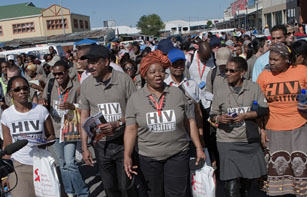
Feature Story
Condom march brings public and HIV prevention commissioners onto the streets in South Africa
06 May 2011
06 May 2011 06 May 2011
Treatment Action Campaign activists and UNAIDS HIV prevention commissioners march for scaled-up access to condoms.
Credit: UNAIDS/AFP Photo G. Guercia
A vibrant gathering took place outside the Treatment Action Campaign (TAC) in Site B in Khayelitsha on 4 May, as members of the public joined with high-level commissioners from the UNAIDS Commission on HIV Prevention to scale-up the use of condoms in communities most severely affected by HIV. Donning ‘HIV Positive’ t-shirts and dancing in unison to the music both on and off stage, Khayelitsha residents and others celebrated condoms as a barrier against the spread of the virus.
“Here in Khayelitsha, Treatment Action Coalition is empowering people living with HIV into leaders of the HIV prevention revolution,” said UNAIDS Executive Director Michel Sidibé, who also acknowledged the TAC’s role as a leading a “global movement for access to HIV treatment.”
Says TAC secretary-general, Vuyiseka Dubula, who is also a member of the UNAIDS Commission on HIV Prevention, “Our view at TAC is that condoms are by far the most effective tool to prevent HIV, and we have taken it upon ourselves team up with the City of Cape Town to increase accessibility.”
The partnership is now in its third year and, says Dubula, it has culminated in the distribution of at least one million condoms per annum in the region, with data from local clinics reporting an obvious drop in the incidence of sexual transmitting infections in the same period. But, she cautions, condom distribution needs to form part of a holistic approach to be most effective.
I was the first African president to report to the UN that my country was in trouble, and we became the first to give out antiretroviral therapy for free. I have come here to greet you and inspire you because we are one.
Former President of Botswana Festus G. Mogae
“We take condoms to people in their houses,” she explains. “We also consistently teach others about the correct use of condoms. We also bring supporting educational material in isiXhosa, we talk about the importance of testing, and we also share information about tuberculosis.”
An important figure at the gathering was a man known to most as either ‘Mr Condom’ or the ‘Condom King’. Hailing from Thailand, Mechai Viradaidya has been proactively distributing condoms for 37 years and, he says, his approach is all about the visibility of condoms—an approach that debunks the myths and gets rid of the taboo.
“Keep on mentioning condoms all the time, and let them be seen and be available everywhere,” he advises. “When I say they must be available, I don’t just mean physically, I mean mentally too. You have to have ‘condoms of the mind’ to really change behaviour.”
Viravaidya smiles and says he hands out condoms, “Absolutely everywhere except funerals.” He explains that he started bringing condoms out into the open in his native Thailand by having a condom-blowing competition amongst school teachers. “Whoever could blow the condom to the biggest size without it bursting was the winner,” he says.
He also set up the ‘cops and rubbers’ programme in Thailand by getting traffic police to sell and distribute condoms. He says that a condom is made of rubber like a tennis ball, “If you’re scared of condoms, be more scared of tennis balls—they contain a lot more rubber!”
Before TAC and the commissioners headed off on their march and on their community condom demonstrations, the crowd was treated to some words of wisdom from former President of Botswana Festus G. Mogae.
“I was the first African president to report to the UN that my country was in trouble,” he told those gathered. “We became the first to give out antiretroviral therapy for free. I have come here to greet you and inspire you because we are one.” He said that he had not come to preach but rather to ask everyone to carry on campaigning ‘until we win’.
“We will overcome,” he said to loud applause. “We need to all make it our business to ensure that no babies are born HIV positive. It is in our power to stop that from happening.”
UNAIDS Executive Director Mr Sidibé highlighted the significance of the event: “Today’s condom march shows that people with HIV are essential partners in movement for Positive Health, Dignity and Prevention.”
The condom march in Khayelitsha was part of a three-day programme convened by the UNAIDS High Level Commission on HIV Prevention in the Mother City. Other events included a panel discussion on social media and mobile technology in the prevention of HIV, and an historical gathering on Robben Island the following day where Desmond Tutu symbolically passed the baton of HIV activism to a group of youth leaders who, he hoped, would join him in stopping the spread of HIV.



